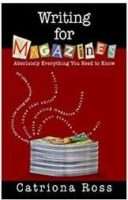Collect stories for composite features. You may hear an interesting story that’s not quite strong enough to stand alone. Don’t discard it. Instead, gather a few more related stories, and write them up as a composite feature – say, teens who spend their pocket money on plastic surgery; women who married for money, then went on to make their own millions; one-hit-wonder sports stars and musicians: where are they now?; the new-generation inventors who’re shaping our future; high-school kids who run successful environmental campaigns; people who love their unusual looks and deformities; ‘They told me I’d never succeed, but I decided to anyway’; ‘I conquered my greatest fear’, and so on.
Stories are everywhere. Be open to them. By merely going about your daily life – checking in on Facebook or Mxit, chatting to your hairdresser, doctor, neighbour or a stranger at the bus stop – you’ll come across loads of story ideas. Scribble down ideas and juicy snippets in your notebook as they come to you (and if that’s in the middle of a conversation with your mates, don’t worry – they’ll get used to it.) Trust me: write your idea down immediately because you won’t remember it later.
Update and recycle story ideas. Finding 100% new stories isn’t always easy, but recycling article ideas is a doddle. Flip through a stack of old magazines (find these in your attic, your local library, your friends’ houses). Back issues, even those published a decade ago, are a rich source of story ideas that simply need an extreme makeover.
Once you’ve been writing features for a few years, you can plunder your own stocks. A story you wrote two years ago on dealing with stalkers may merely need a rewrite and update (to include cellphone and chatroom stalking, and new case studies, for instance), and – ta-daa! – it’s a new piece, perfect for a different magazine.
Know who’s visiting your city. Celebrities, politicians and other VIPs travel constantly. Stay in touch with the news, so you know who’s arriving in your country when. Armed with this knowledge, you’re able to approach an appropriate magazine and pitch the idea of a story on Celebrity X. If given the go-ahead, you can confidently approach Celeb X’s publicity people and say ‘Hi, I’m calling from Marie Claire/Reader’s Digest/GQ. I’d like to set up an interview with Celebrity X.’
Go to events. Press events, book launches, exhibitions, the opening of an envelope – get yourself there. Events are fun, free snacks and drinks are on offer (another perk of the freelance writing life), and you’ll discover a hotbed of story ideas. Use events as networking opportunities: meet people, talk to interesting strangers, swap business cards.
Understand what readers want. People essentially want to read about themselves: their stresses and worries; their hopes, joys and triumphs in life. They like reading about subjects and people they can relate to, experiences that mirror theirs, and wisdom they can apply to their own lives. Ask yourself, ‘Would I be curious about this story?’ and ‘What would make me want to read this article?’
Hot tip! Highlight the key
In each clipping you collect, circle or highlight the point, quote, opinion or statistic that piqued your interest. This means you’re quickly reminded of why you cut it out when flipping through your clippings file.
Hot tip! Use your library
Your local library is a wonderful, underrated source of story ideas and research tools. Go every few weeks to browse the books, read the newspapers and magazines, linger at the community notice board, eavesdrop on conversations, page through the old books on sale. The library’s free! Use it.
***
Stories that sell
Certain topics and types of articles are always popular – as long as they’re written in a way that entertains and involves readers, and informs people on issues they want to know about.
Career advice
Celebrities
Composite features: various people who all share a certain experience (for instance, adopted children who’ve tracked down their long-lost twin siblings; people who spend a month a year overseas doing voluntary work.)
Entertainment (TV, movies, music)
Health and fitness
How-to stories
Humour
‘I tells’: personal experiences, written in the first-person
Money, especially personal finance
New technology
Personalities and profiles
Politics
Popular science
Rags-to-riches stories
Relationships
Scandals and exposés
Self-help and self-improvement
Service pieces (see box below)
Sex: advice, how-to, personal stories
Shopping and new products
Sports
Travel
Trends and popular culture
Triumphs over adversity
True crime stories

